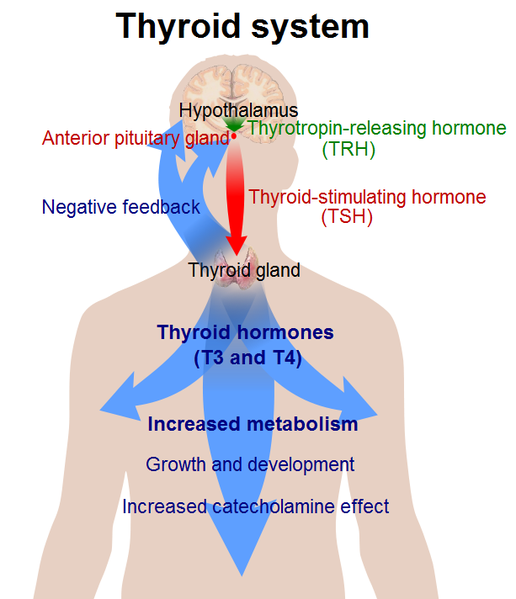We hear so much about the thyroid today and it seems that almost everyone has or thinks they have a thyroid problem. So what’s the deal – is thyroid disease really increasing that much? Are all these people complaining of depression, fatigue and difficulty losing weight just looking for excuses or can these problems be attributed to a sluggish thyroid? Well, a simple answer does not exist for this complex, multifactorial problem. First of all, how many know what the thyroid is and does?
What does your thyroid do?
The butterfly shaped thyroid at the base of the neck is responsible for a myriad of bodily processes and is essential to life. The thyroid regulates all metabolic processes including the metabolism of every cell in your body, your body temperature and cerebral function. Adequate thyroid is critical in pregnancy since low levels can result in impaired cognitive function in the baby. Even low levels as opposed to overt hypothyroidism can be dangerous for the baby in pregnancy. Thyroid hormone is involved in cholesterol, fat, and cerebral metabolism. Studies support the beneficial effects of optimal thyroid hormone on the heart. Low thyroid hormone leads to lipid abnormalities, cardiac arrhythmias and increased risk for atherosclerosis.

Why is there so much thyroid dysfunction?
The thyroid, while ever so important, is susceptible to a wide range of insults and needs the support and appropriate interaction of other hormones to do its job. In young women, taking oral contraceptives results in a decrease in thyroid function due to an increase in a protein binding agent, sex hormone binding hormone (SHBG), which interferes with circulating thyroid hormone and can result in symptoms of depression, weight gain, irritability, and mood swings. Environmental toxins that act as xenoestrogens (chemicals such as BPA in plastics that act as estrogens) can do the same thing. Gluten sensitivity is associated with Hashimoto’s thyroiditis. The ubiquitous occurrence of gluten in our Standard American Diet (SAD) is thought to be a contributing factor. Cortisol, another essential hormone which we will discuss in a later post, is also necessary for the thyroid to function optimally. Low or high cortisol is associated with our stressful lives and is a major contributor to adrenal dysfunction, which seems to be an increasing problem. Optimal adrenal function is essential to optimal thyroid function.

Is it really the thyroid?
The symptoms of hypothyroidism are nonspecific and common. They include memory loss or forgetfulness, depression, mood swings and irritability, muscle weakness, hair loss, anxiety, heart palpitations, sleep disturbances, and irregular periods. Sound like symptoms of perimenopause or menopause? Yes, and the thyroid is frequently involved in the severity of these symptoms, and hypothyroidism may be overlooked when accompanied by menopause. Treating menopause may help but does not completely resolve the symptoms. The symptoms of hypothyroidism are the same as the symptoms of “aging” – fatigue, dry skin, thin nails, forgetfulness, insomnia, weight gain, depression, hair-loss, feeling cold all the time. To further confuse the picture, thyroid lab results frequently do not reflect the whole picture and there is controversy about which lab tests best reflect thyroid function. Physicians are trained to measure TSH (thyroid stimulating hormone) as the best marker, but the TSH can be “normal” when the T3 is very low and the patient may have hypothyroid symptoms with “normal numbers”. The numbers have to be correlated with symptoms and other reasons for low thyroid function.
There are 4 main reasons for low thyroid function:
- low production of hormone which can occur after Hashimoto’s thyroiditis
- poor conversion from T4 (storage hormone) to T3 (active hormone) may be related to nutrient (iodine, iron, manganese, selenium) deficiency
- supplementation with T4 (levothyroxine or synthroid) only, which may fail to convert to the active T3 and can result in normal “numbers” but poor results for the patient
- receptor site insensitivity in spite of adequate thyroid levels
What to do?
Optimal thyroid function is essential for optimal metabolism throughout your body. The production of thyroid hormone declines for a number of reasons including other hormones, toxins, and aging. A typical scenario might be a 40-year-old perimenopausal woman who sees her doctor for heavy bleeding and is put on oral contraceptives to control the bleeding and normalize her periods. In a few months, she begins to experience fatigue, mood swings, irritability and depression so she is placed on anti-depressants. The reverse is also typical and the anti-depressants may come first as the symptoms are attributed to perimenopause when it is really clinical or subclinical hypothyroidism. If you have symptoms of hypothyroidism and have seen doctors and been told your “numbers are normal”, but you still feel hypothyroid, I encourage you to find a physician knowledgeable in bio identical and thyroid hormone supplementation. Your symptoms are real and your thyroid may be a contributing factor.



